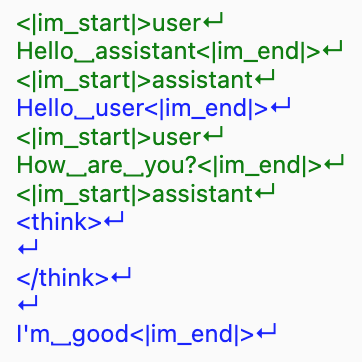Add assistant mask support to Qwen3-0.6B
Enable Assistant Token Masking for Qwen3-0.6B
This pull request introduces support for assistant token masking in Qwen models by incorporating the {% generation %} tag within the chat template.
HuggingFace Transformers supports returning a mask of the tokens generated by the assistant in the return_assistant_tokens_mask argument of tokenizer.apply_chat_template (see huggingface/transformers#30650). Unfortunately, a lot of LLMs don't support this feature yet even though it's been a year since it was added.
🛠️ Chat Template Proposed Change
--- tokenizer_config.json (original)
+++ tokenizer_config.json (modified)
@@ -40,14 +40,17 @@
{%- set content = content.split('</think>')[-1].lstrip('\n') %}
{%- endif %}
{%- endif %}
+
+ {{- '<|im_start|>' + message.role }}
+ {% generation %}
{%- if loop.index0 > ns.last_query_index %}
{%- if loop.last or (not loop.last and reasoning_content) %}
- {{- '<|im_start|>' + message.role + '\n<think>\n' + reasoning_content.strip('\n') + '\n</think>\n\n' + content.lstrip('\n') }}
+ {{- '<think>\n' + reasoning_content.strip('\n') + '\n</think>\n\n' + content.lstrip('\n') }}
{%- else %}
- {{- '<|im_start|>' + message.role + '\n' + content }}
+ {{- content }}
{%- endif %}
{%- else %}
- {{- '<|im_start|>' + message.role + '\n' + content }}
+ {{- content }}
{%- endif %}
{%- if message.tool_calls %}
{%- for tool_call in message.tool_calls %}
@@ -68,7 +71,8 @@
{{- '}\n</tool_call>' }}
{%- endfor %}
{%- endif %}
- {{- '<|im_end|>\n' }}
+ {{- '<|im_end|>' }}
+ {% endgeneration %}
{%- elif message.role == "tool" %}
{%- if loop.first or (messages[loop.index0 - 1].role != "tool") %}
{{- '<|im_start|>user' }}
Why This is Important
As an example, distinguishing between tokens generated by the assistant and those originating from the user or environment is critical for various advanced applications. A prime example is multi-turn Reinforcement Learning (RL) training.
Currently, in frameworks like VeRL, identifying actor-generated tokens often requires manual reconstruction from the model's output. With this change to chat template, this process should be significantly simplified by leveraging existing solutions and not reinventing the wheel.
It would be great if Qwen models supported this feature, as they are widely used in the RL community.
🚀 Usage Example
The following demonstrates how to retrieve the assistant token mask:
import transformers
tokenizer = transformers.AutoTokenizer.from_pretrained("Qwen/Qwen3-0.6B")
conversation = [
{"role": "user", "content": "Hello assistant"},
{"role": "assistant", "content": "Hello user"},
{"role": "user", "content": "How are you?"},
{"role": "assistant", "content": "I'm good"},
]
tokenized_output = tokenizer.apply_chat_template(
conversation,
return_assistant_tokens_mask=True,
return_dict=True,
)
print("Tokenized Output with Assistant Mask:")
print(tokenized_output)
# BEFORE
# {'input_ids': [151644, 872, 198, 9707, 17847, 151645, 198, 151644, 77091, 198, 9707, 1196, 151645, 198, 151644, 872, 198, 4340, 525, 498, 30, 151645, 198, 151644, 77091, 198, 151667, 271, 151668, 271, 40, 2776, 1661, 151645, 198],
# 'attention_mask': [1, 1, 1, 1, 1, 1, 1, 1, 1, 1, 1, 1, 1, 1, 1, 1, 1, 1, 1, 1, 1, 1, 1, 1, 1, 1, 1, 1, 1, 1, 1, 1, 1, 1, 1],
# 'assistant_masks': [0, 0, 0, 0, 0, 0, 0, 0, 0, 0, 0, 0, 0, 0, 0, 0, 0, 0, 0, 0, 0, 0, 0, 0, 0, 0, 0, 0, 0, 0, 0, 0, 0, 0, 0]
# }
# AFTER
# {'input_ids': [151644, 872, 198, 9707, 17847, 151645, 198, 151644, 77091, 198, 9707, 1196, 151645, 198, 151644, 872, 198, 4340, 525, 498, 30, 151645, 198, 151644, 77091, 198, 151667, 271, 151668, 271, 40, 2776, 1661, 151645, 198],
# 'attention_mask': [1, 1, 1, 1, 1, 1, 1, 1, 1, 1, 1, 1, 1, 1, 1, 1, 1, 1, 1, 1, 1, 1, 1, 1, 1, 1, 1, 1, 1, 1, 1, 1, 1, 1, 1],
# 'assistant_masks': [0, 0, 0, 0, 0, 0, 0, 0, 0, 0, 1, 1, 1, 1, 0, 0, 0, 0, 0, 0, 0, 0, 0, 0, 0, 0, 1, 1, 1, 1, 1, 1, 1, 1, 1]
# }
Visualizing the mask helps understand which parts of the input correspond to the assistant's generation:
Testing
- Verified template works with both tool and non-tool scenarios
- Verified works with reasoning content
Thanks for adding support for return_assistant_tokens_mask, this really simplifies training processes.
One small suggestion: since Qwen3 supports enable_thinking, it’d be helpful to also have a flag like exclude_think_from_mask to optionally skip masking the thinking part, because in practice this part is not generated by the model if enable_thinking=False is set. Would be great to have that flexibility. Thanks again!
@zhusl-cpu Thank you for your comment. I am not affiliated with Qwen, so unfortunately this PR has been stale for some time. If you find it useful, I’d really appreciate any help in reaching the maintainers. I am really looking forward to adding this to Qwen.
When it comes to thinking tokens, appreciate you bringing it up. Supporting that would likely need changes on Hugging Face’s side to support more fine-grained tagging beyond just generation. For now, tweaking the chat template might be a workable workaround.
